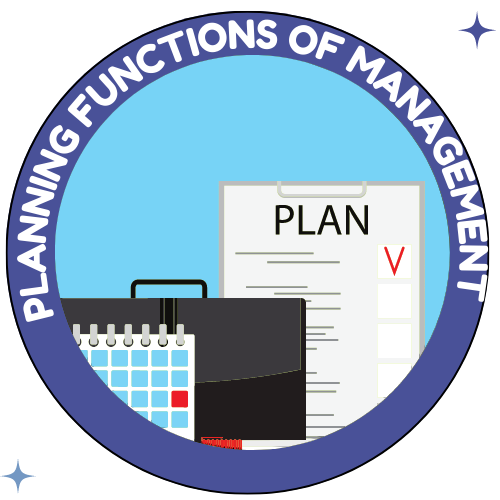Planning function of management involves foreseeing actions, setting goals, allocating resources, and deciding courses of action. It’s the foundation of effective management.
Planning anticipates needs, coordinates resources, and ensures alignment between goals and available resources.
Read Also: 5 Functions of Management
A well-structured plan increases efficiency and reduces uncertainty. Koontz & O’Donnell highlight planning’s role in bridging current status with desired outcomes.

The planning process comprises several key steps:
- Defining Objectives: Goals guide activities and reflect management’s focus. Clear objectives are essential for effective planning. Effective planning necessitates considering internal and external factors. Internal factors like company philosophy and labor relations shape the plan’s contour.
- Establishing Planning Premises: Assumptions about future conditions help identify potential obstacles and facilitate proactive adjustments.
- Choosing Alternatives: Evaluating different paths, considering resources and outcomes, and selecting the most feasible option. External factors include socio-economic changes, political developments, and economic shifts, influencing planning’s adaptability.
- Formulating Derivative Plans: Developing sub-plans that support primary goals through detailed policies, procedures, and schedules. Derivative plans are supportive blueprints underpinning primary objectives. These sub-plans clarify policies, rules, and schedules to facilitate successful execution.
- Securing Co-operation: Involving team members fosters motivation, garners input, and promotes better execution. Cooperation is pivotal. Engaging team members aligns efforts and improves implementation. Valuable insights arise, refining plans and bolstering commitment.
- Follow-up and Appraisal: After implementation, monitoring outcomes, receiving feedback, and refining plans to enhance future success. Follow-up ensures executed plans align with intentions. Feedback rectifies deviations, strengthening the link between planning and control.
Planning’s significance lies in its impact on management efficiency, resource optimization, and goal achievement. Planning clarifies objectives, harnesses resources, and drives systematic progress.
Urwick emphasizes methodical thinking, acting based on facts. Planning is a mental framework for organized, fact-driven actions.
In conclusion, planning is the cornerstone of effective management. It’s a proactive process, uniting resources and goals, propelling organizations toward success. Through systematic steps, cooperation, and continuous evaluation, planning maximizes efficiency and propels achievements.
In the words of Benjamin Franklin, ‘By failing to prepare, you are preparing to fail.’
